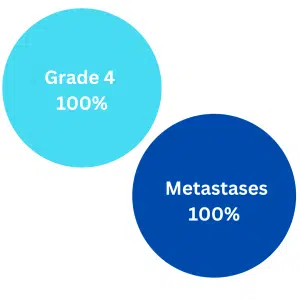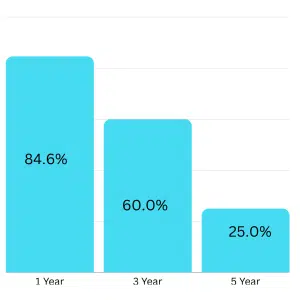
Colorectal Cancer, often referred to as colon cancer, is a type of cancer that starts in the colon or rectum, which are parts of the digestive system. It typically begins as small, noncancerous growths called polyps that can turn into cancer over time. Colorectal Cancer is one of the most common forms of cancer and can cause symptoms like changes in bowel habits, rectal bleeding, and abdominal discomfort. According to the World Health Organization (WHO), Colorectal Cancer remains a common form of cancer, contributing to a substantial number of new cancer diagnoses annually. In the quest to combat this formidable disease, innovative therapies and medical advancements offer a ray of hope. Among these, Dendritic Cell Therapy (DCT) has emerged as a promising approach in the management and survival rates of Colorectal Cancer. In this article, we examine the current Colorectal Cancer statistics at Immucura, delve into the characteristics of this disease, and explore the latest findings on the efficacy of Dendritic Cell Therapy in the fight against Colorectal Cancer.
At Immucura, a comprehensive analysis of cancer statistics and survival rates among 409 patients was conducted between December 2020 and April 2023. This study provides valuable insights into the prevalence and outcomes of various cancer types. Focusing on Colorectal Cancer, we discuss cancer grades, the presence of metastases, and the survival rates over 1, 3, 5, and 10 years for all cancer cases combined and specifically for Colorectal Cancer patients.
The global patient data at Immucura reveals a near-equal distribution of male and female patients, with 49.6% male and 50.4% female. Among the 24 recorded cancer types, a sample of 117 patients was selected for study. Colorectal Cancer constituted a significant portion, accounting for 11.1% of cases. Other prevalent cancer types included brain and central nervous system (12.8%), breast (22.2%), pancreas (10.3%), and prostate (7.7%). These statistics underscore the importance of addressing Colorectal Cancer due to its relatively high incidence.
The data from Immucura shows varying levels of malignancy when assessing cancer grades. An alarming 77.8% of patients were diagnosed with grade 4 cancer, indicating that many patients initiate complementary therapies, such as DCT, in the later stages of the disease. In contrast, only 1.7% of cases were grade 1, with grades 2 and 3 representing 4.3% and 6.0%, respectively. Regarding metastases, approximately 79.4% of patients presented with metastatic Colorectal Cancer, emphasizing the need for effective therapies targeting advanced-stage diseases.

Examining survival rates is critical to understanding the effectiveness of therapy. After one year, the data from Immucura reveals a promising 84.6% survival rate among all cancer cases combined, based on 109 patients. However, survival rates decline over time, with 60% at 3 years (86 patients), 25% at 5 years (79 patients), and 9.2% at 10 years (76 patients).
For patients diagnosed with grade 4 cancers, the survival rates at Immucura offer a more specific perspective. Within the first year, the survival rate for patients with colorectal cancer stands at 100% among 100 patients. Over three years, the rate decreases to 60% (60 patients) and further drops to 25% at five years (50 patients). These findings underscore the challenges associated with managing advanced-stage cancers and emphasize the importance of early detection and intervention.

From the sample of 117 patients, 13 patients were diagnosed with Colorectal Cancer. Examining Colorectal Cancer cases specifically, Immucura’s data highlights the distribution of cancer grades and the presence of metastases. Among Colorectal Cancer patients, grade 4 cancers account for a significant 100%, indicating the severity of advanced Colorectal Cancer cases. Furthermore, 100% of patients presented with metastatic Colorectal Cancer. Considering the survival rates for Colorectal Cancer, Immucura’s data provides valuable insights. Over one year, all 13 patients diagnosed with Colorectal Cancer survived, demonstrating a 100% survival rate. At three years, the rate remained at 60%, which is promising for patients facing advanced Colorectal Cancer. However, the 10-year survival rate was not available due to the limited timeframe of the study.
In conclusion, Immucura conducted a comprehensive analysis of cancer statistics and survival rates on 409 patients between December 2020 and April 2023. Colorectal Cancer accounted for 11.1% of cases, making it a significant concern. The study considered cancer grades and the presence of metastases, revealing a high prevalence of grade 4 cancers and metastatic disease among Colorectal Cancer patients. Survival rates for Colorectal Cancer at Immucura are promising, with all patients surviving the first year and a 60% survival rate at three years. These findings suggest the potential effectiveness of Dendritic Cell Therapy in treating advanced Colorectal Cancer. However, further research is needed to assess long-term survival rates and the impact of DCT on Colorectal Cancer patients over extended periods.
© 2025 Immucura. All Rights Reserved
Loading: Please wait…
Loading form: Please wait…
Loading: Please wait…
Loading form… Please wait…
Loading form: please wait…